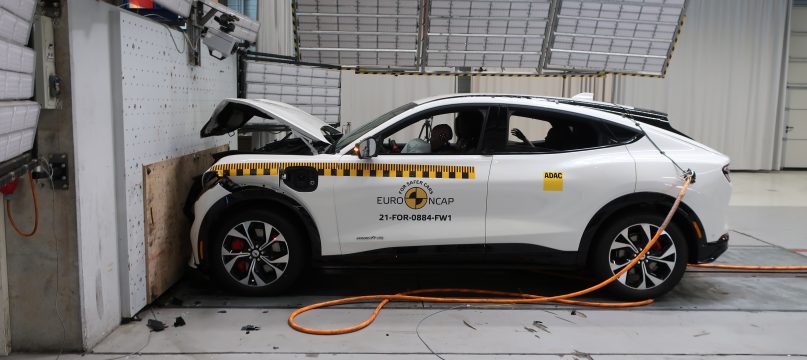
27 October 2021 – Today, Euro NCAP releases safety ratings for five new cars. The Ford Mustang Mach-E, Hyundai’s IONIQ 5 and TUCSON and the Toyota Yaris Cross all achieve a top rating of five stars, while the new Hyundai BAYON is awarded four stars.
Ford’s new all-electric crossover SUV, the Mustang Mach-E, bears little resemblance to the 5-litre muscle car with which it shares its name. While its sports-car stablemate struggled to gain three stars in 2017, the Mustang Mach-E firmly secures a top five-star rating against the latest test requirements. The car comes equipped with a centre airbag, deployable bonnet for vulnerable road user protection and a host of advanced driver assistance features, offering high levels of driver support and crash prevention all around. Having simultaneously achieved a five-star rating by the environmental test programme Green NCAP, Ford demonstrates that fighting climate change will not stand in their way of improving road safety.
Hyundai impresses with three new models in this publication, the all-electric IONIQ 5 and TUCSON, gaining 5-star ratings and Hyundai Bayon achieving 4 stars. Although the TUCSON only just clears the hurdle in Safety Assist to get into five-star territory, both IONIQ 5 and TUCSON display good all-round safety. The crossover SUV Bayon, fighting its way into an already overcrowded and highly competitive segment, lacks the centre airbag that is standard in IONIQ 5 and TUSCON. Nevertheless, the Bayon comes with robust crash protection and crash-avoidance features which help to secure it a creditable four-star rating.
The Toyota Yaris Cross follows hot on the heels of the Mirai and Yaris with another five-star rating. The car, available at petrol and HEV petrol, was tested partly in Australia and Europe, two important markets for the Yaris Cross. The result is published in collaboration with sister organisation ANCAP.
In addition to its traditional safety crash and safety tests, Euro NCAP retested two light commercial vans: the Ford Transit and the Ford Transit Custom, after Ford made seat belt reminders as standard for all occupants across the European market. This now results in two Gold Winners in our Commercial Van ranking.
Michiel van Ratingen, says, “Vehicle use in road traffic is the most significant contributor to work-related traumatic injury, so small improvements, especially those that promote seatbelt wearing, can go a long way. Congratulations to Ford for updating their two commercial vans and making the effort of putting seat belt reminders as standard for drivers and co-drivers.”
Finally, Euro NCAP evaluated the electric Volvo XC40 Recharge and plug-in hybrid VW Touareg PHEV. Both cars share their respective rating with its conventionally-engined siblings tested in 2018.
For more info go to Euro NCAP’s 2021 Commercial Van Safety campaign page.
For a full set of results go to our Commercial Van Ratings page.
Editor’s note
For full results, visit www.euroncap.com or Euro NCAP’s newsroom for journalists.
For media information, please contact us at media@euroncap.com.
Follow us online and on social media:
Twitter
Facebook
Instagram
YouTube
About Euro NCAP
Euro NCAP organizes crash & safety tests on new vehicles and provides motoring consumers with a realistic and independent assessment of the safety performance of some of the most popular cars sold in Europe. Established in 1997 and backed by several European Governments, motoring, consumer and insurance organizations, Euro NCAP has rapidly become a catalyst for encouraging significant safety improvements to new car design. Visit our website: www.euroncap.com.
Euro NCAP ratings strictly apply to vehicles of the specifications offered in Europe. The ratings do not necessarily apply to models offered in other regions, even when sold under an identical name, as production specification and equipment may vary.